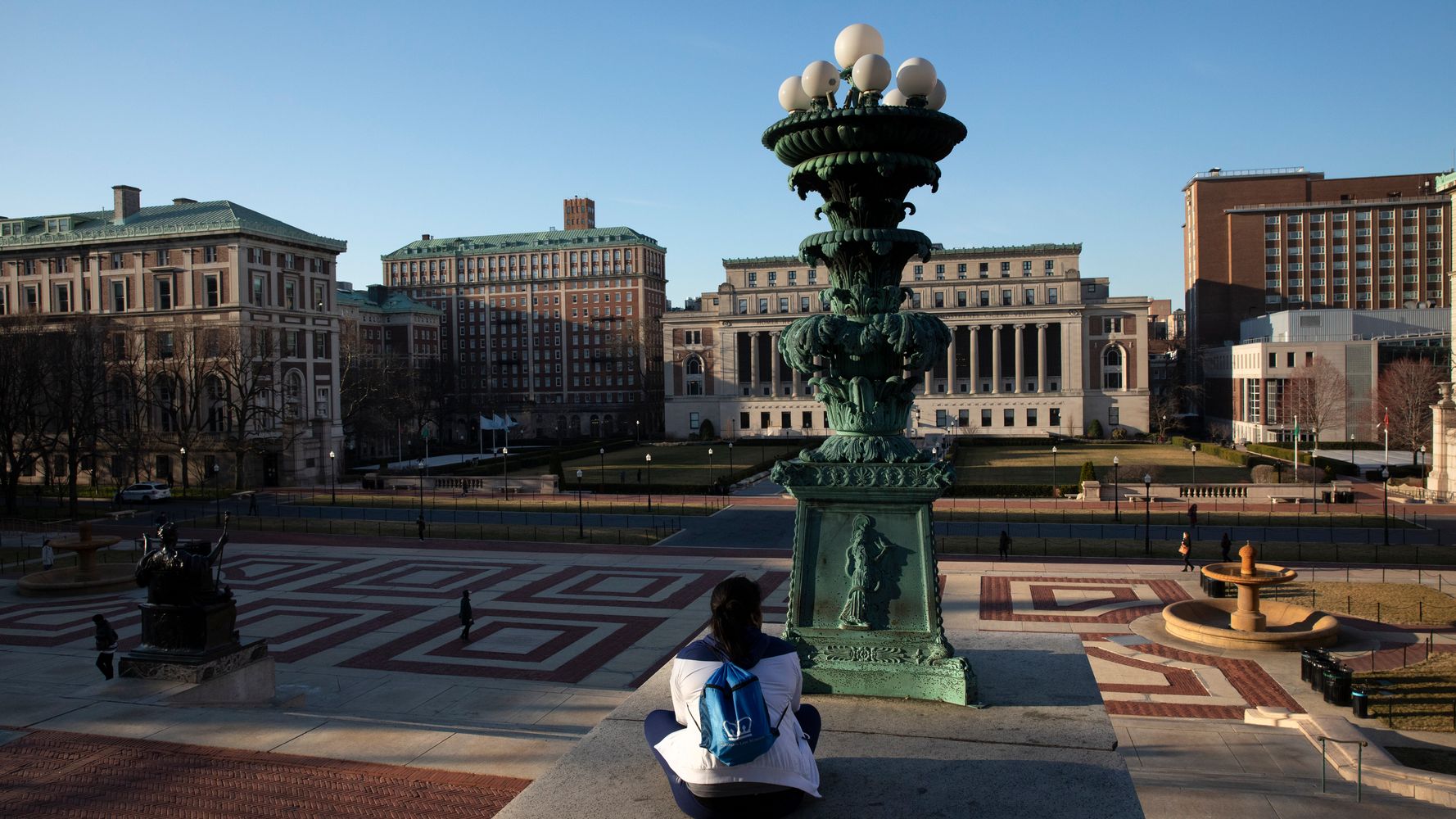[ad_1]
College students across the country have headed home in recent days as their campuses have shut down to try to contain the spread of the coronavirus.
Students who thought they’d be saying goodbye for a week of spring break instead said goodbye for the year, or maybe more.
Young people studying abroad have had to pack up and come back from what was supposed to be the experience of a lifetime.
And being able to walk across the stage at graduation seems unlikely to happen this spring.
HuffPost spoke with a dozen students who are figuring out what to do from here. Schools are offering classes online, but how do you pursue a dance degree online? What about a theater degree? How do you do a science lab while sitting in your childhood bedroom and staring at a computer screen?
Students are heartbroken at missing out on little moments that make college special ― the annual dinner for the school newspaper, a trip for a class, senior traditions and last chances to be with friends before graduating.
But there are also more pressing concerns. How will having to go entirely online affect their professional opportunities? What will the economy look like when they’re trying to get jobs?
And for some students, where should they go when they don’t have a safe place to return to on such short notice? What if their home doesn’t have a Wi-Fi connection?
Many students are also grappling with guilt at being disappointed with what’s happening while knowing that they’re in a far more fortunate place than others.
Hope Schmalzried, a senior at Stanford University, described the feeling as “that weight between feeling really upset and mournful, and you don’t know when you’re going to see your friends again, versus, this is an international crisis. It’s whole countries locked down and there are a lot of populations at risk. And so it’s like balancing that emotional dichotomy has been really sobering.”
Missing Out On Milestones
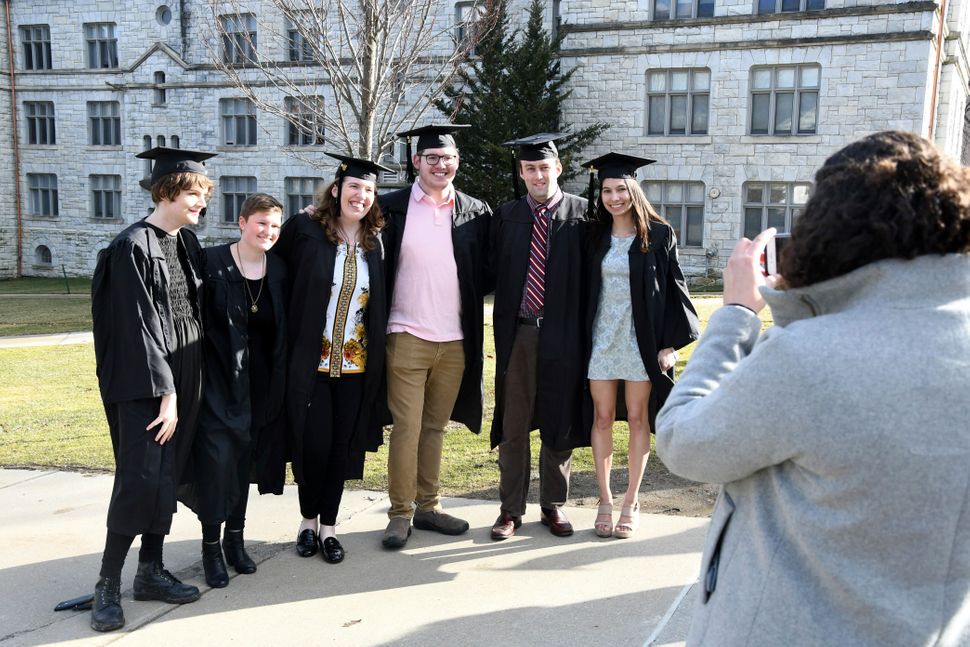
Mackenzie Diggs, a senior at Ball State University in Indiana, said she would feel “devastated” if graduation is canceled.
“I never thought I was going to go to college. No one in my family’s ever been. I’m the only one of my siblings that even graduated high school. So I never thought that college was in the cards. And somehow I just ended up here. I don’t really know what I did or how I got here, and I’m about to graduate and I’m about to get that taken away from me. So that kind of sucks.”
Gillian Wanosky, a junior at West Virginia University, is trying to figure out how to continue her dance major, and her dance team’s trip to nationals has been canceled.
“We were running our routine full-out Tuesday and by 24 hours later, I found out that we’re not going. I mean, it’s heartbreaking. I know that it could be worse, but that would have been the last time I performed with my best friend who I’ve been dancing with since I was six years old. And just to have it all come to an end. When we told everyone ― that was probably the hardest moment was seeing everyone cry.”
Sophomore Amanda Salazar at New York’s Baruch College said The Ticker, the student-run newspaper where she’s an editor, is trying to figure out how it will go online-only. The paper’s traditions, including a trip to Boston, have all been canceled.
“We were planning on visiting the Boston Globe and the Harvard Crimson and just doing some sightseeing. That was canceled, and I’m hoping we get reimbursed because we already bought the tickets. And every year we have a Ticker dinner. It’s basically our gala of the year where we give out awards people who are leaving positions, pass the torch down to the people who are taking positions. That’s going to be canceled.”
Kelly Rose Nunziata is pursuing a master of public administration degree at Columbia University in New York. She was supposed to go to Iceland for work she was doing with the country’s Ministry of Environment and Natural Resources, but her trip has been called off. More devastating, said Nunziata, would be losing out on graduation.
“I have a feeling graduation’s going to get canceled and that’s like really crushing, especially for my family. … Like my grandfather helped me pay for this degree, and he’s not going to get to see me graduate from Columbia, which would’ve been amazing.”
Uncertainty Around Professional Plans
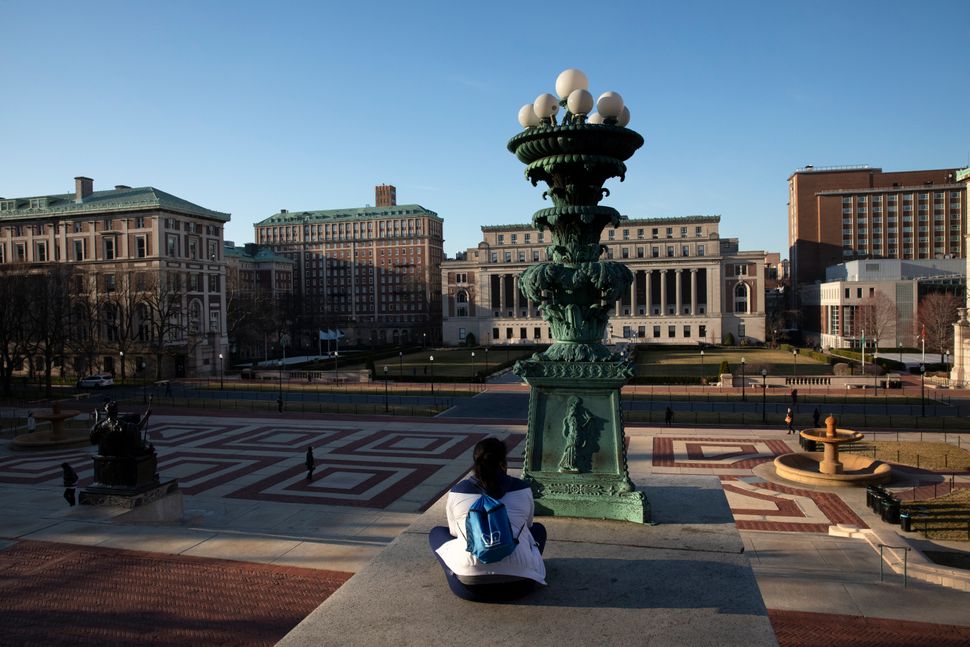
Kayla Shull is a graduate nursing student at Seattle University and isn’t sure if she’ll be able to do her clinical placement this spring ― meaning she might not fulfill the requirements to get her nurse practitioner license.
“If we lose this spring quarter clinical placement, the possibility of us having to do clinical placements in the quarter after we graduate ― so it would be summer of 2021 ― is a big possibility. So we would walk for graduation, but we would not be able to sit for boards until we have those hours under our license. …
I wouldn’t be able to take my boards on time, which means that I wouldn’t be able to start practicing as a psychiatric nurse practitioner when I want or when they expected us to start practicing, which would’ve been the fall of 2021. … So I would have to wait and I couldn’t get a job.
I’d still be working as a nurse, still getting paid pretty cheaply, and I have tons of student loans I need to start paying back.”
Alex Adams, a senior political science major at Florida State University, won’t be able to actually visit graduate schools before making a decision.
“I’ve been applying to graduate schools this semester and so I wanted to use my spring break to tour some of those institutions. Those tours have been canceled, so I won’t actually be able to do that.”
Nunziata, the Columbia University student studying for a master’s in public administration, said there’s deep anxiety about entering into the job search in an economy that will be struggling to recover.
“One thing that we’re really worried about is our job search. We are all leaving with soul-crushing amounts of student loans and we were kind of, well like, you know, fingers-crossed, hoping to have a job when you graduate. But if that didn’t happen, sometime in the summer we were expecting [to find one] ― and now it seems like the economy is tanking.”
Garrett Davis is a student at Green River Community College, about 30 miles outside of Seattle. The state has been hit hard by COVID-19, and Davis said it’s been hard getting reliable information.
“Students are in a low information environment and being given contradictory advice from professors, administrators, the news and the government. Consistently, there are two responses I’ve seen from fellow students: ‘Oh God, we’re going to die,’ and ‘This is overblown we should be going about life as usual.’” If you ask 10 professors where to turn for information, you get 11 different responses. Nobody wants to talk about what future semesters look like, and it feels like we’re all supposed to pretend like life is normal until spring break despite in-person classes being canceled so the school doesn’t look bad.”
Academic Challenges
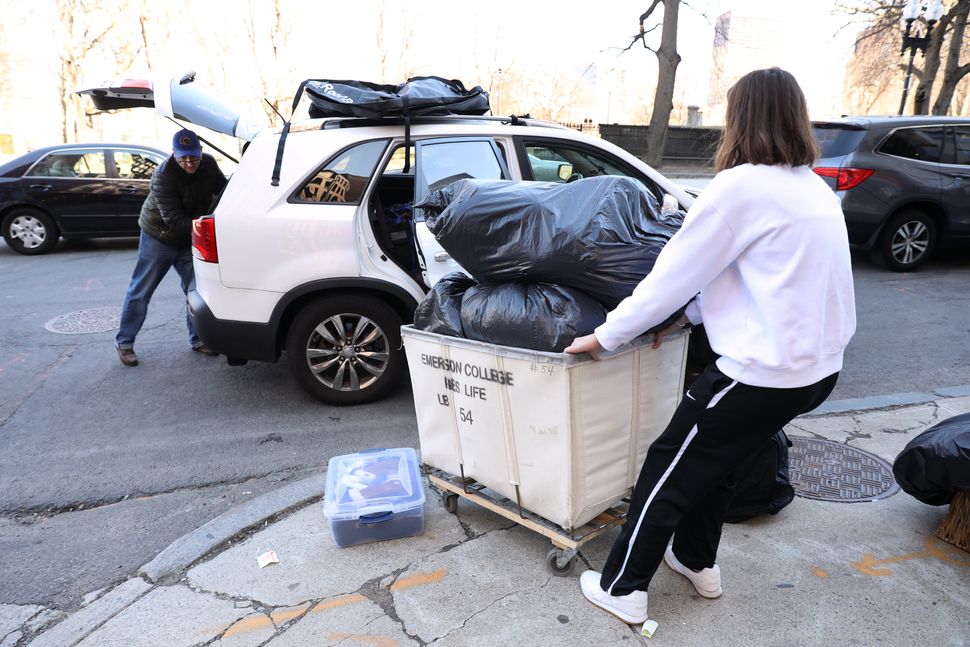
Megan Parker, a senior at the University of Akron in Ohio, said her professor is having trouble figuring out how to teach a science lab course online.
“I think the hardest part about this is a lot of classes can’t transfer into an online format easily. One of my classes this semester is a science with a lab and my professor is racking her brain trying to figure how to do this lab component online. And although most of the professors at my university have done online, there are still several who haven’t. So it’s going to be interesting to see how those students still get quality education from those who have never taught online.”
Raag Agrawal, a senior at Columbia University, said he’s disappointed not to be able to attend classes in person, where he’s able to develop relationships with other students and professors. But he’s also worried about how students from lower-income backgrounds may be affected with online-only education.
“I have the resources and ability to have a desk and study and be well-fed. But I think distance-learning … majorly affects students who are low-income or don’t have the access [to online resources]. … I think this is just going to exacerbate a lot of the disparities you see in colleges in terms of achievement.”
Victor Lopez-Carmen is a first-year student at Harvard Medical School. (The university, at large, has faced some criticism from students for the way it has handled its coronavirus response.) He said that it’s hard to get the same quality education through distance-learning.
“It’s both disappointing and understandable because we want to prioritize the health of the people around us and our patients. And objectively speaking, we do present an increase in potential exposure to our patients if we stay. … So the risk is high here, and I understand the decision.
At the same time, for so many of us here, being in Harvard Medical School is a dream come true. And the fact that our classes have become online when in-person exposure, the discussions we have together when we’re sitting at tables and all of the accessory experiences that we have just being here, are just so vital. So there’s a lot of anxiety about what will become of our education now that our medical school is essentially virtual.”
Shull, the graduate nursing student at Seattle University, said she’s disappointed that she will be getting an online-only education even though she paid for the on-campus experience ― a sentiment that was common among students.
“My classmates and I feel like we’re hemorrhaging money for an online program that we could have done for way cheaper. … I don’t feel like I’m getting a well-rounded education, especially in something like becoming a nurse practitioner, where you have to be hands-on with a lot of things because you’re working with patients. So I think that’s my biggest fear is that I’m not going to feel prepared to be a practitioner.”
Problems Moving Home
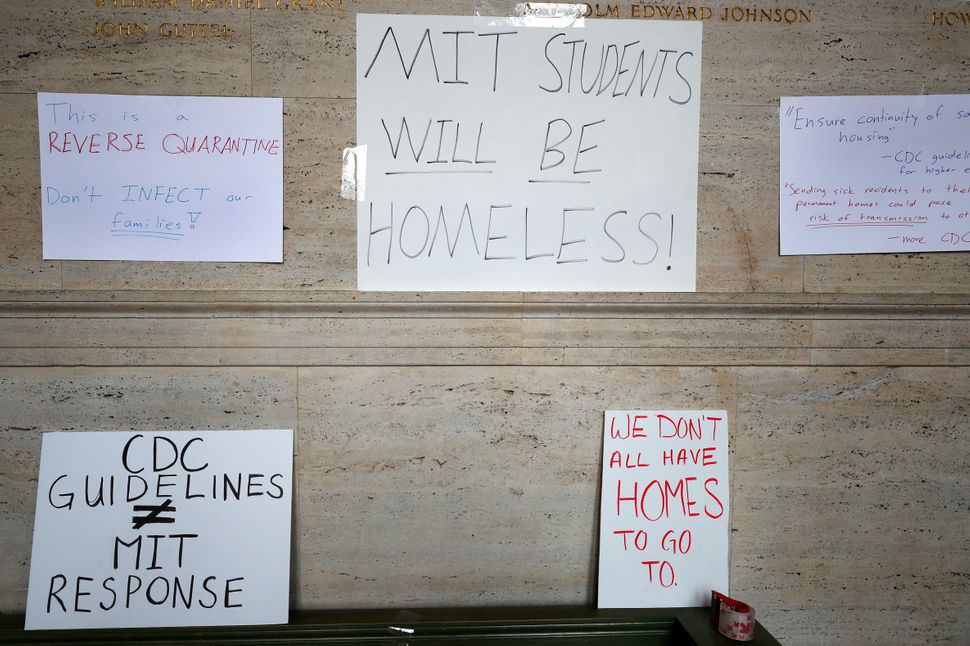
N’Kenge Robertson graduated from Michigan State University last year with an education degree, but she’s still at the school for her final internship year. She works at a school where many students get free and reduced lunch and depend on the school as a safe space. She said she’s worried for people ― whether in college or in grade school ― who will be losing that place while institutions are shut down.
“I feel like [many policies don’t] count those that actually need school as a safe space. So being an educator, and being anti-racist educator, I started to look into things like, how are we bending for the disabled, the elderly, students that do come from those poor environments, who actually depend on school for their day-to-day basic needs? How are we going to fix that issue?”
Lopez-Carmen, the Harvard Medical School student, moved off-campus and will be staying with his brother.
“Home for me is Tucson, Arizona. But I’m going to go to the Bay Area to be with my older brother because I already had a ticket there for spring break, and I don’t really have the finances to change it. …
But for me it’s quite complicated because I come from two Native American tribes and there are a bunch of ceremonies. There’s a ceremony this next weekend in South Dakota, because I’m Dakota from the Crow Creek Sioux tribe. And one of the chiefs asked me if I could come. There’s another ceremony back in Arizona because I’m from the Yaqui tribe, and my family really wants me to be there.
I’m considering the dangers because reservations aren’t as prepared as a lot of other communities. And I’m coming from hospitals. I spent all day in a hospital yesterday, seeing patients, and if I were to be a vector for this, in my community, I think it would be pretty devastating.”
Agrawal, the senior at Columbia University, is worried about heading home because it’s close to New Rochelle, New York, the first place in the U.S. to declare a containment zone.
“I don’t think they did it in the smartest way either because, I mean, I live in Scarsdale in Westchester, which is like two stops away from New Rochelle which is locked down right now. My going home is basically right next to the outbreak. … They are prorating everyone’s housing, and they give everyone refunds. I know a lot of students who are financially insecure who are deciding to move out because of that.”
Calling all HuffPost superfans!
Sign up for membership to become a founding member and help shape HuffPost’s next chapter
[ad_2]
Source link

